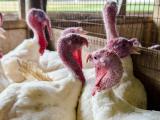June 23, 2006 (CIDRAP News) – Avian flu vaccination programs in poultry that are widely but imperfectly instituted, like those in China and Indonesia, may impede detection of human cases, according to a report from the European Centre for Disease Surveillance and Control in Stockholm.
The report, in yesterday's online Eurosurveillance Weekly, also says that the avian flu situation in Africa is especially bleak and likely has placed large numbers of people at risk for H5N1 infection.
"Surveillance for H5N1 cases in humans," the authors write, "is becoming harder where poultry immunization is widely but imperfectly implemented, because the marker of local poultry deaths for human case detection is being lost.
"Declines in the number of sporadic human cases in countries with poultry vaccination programs should therefore be interpreted cautiously."
The World Health Organization (WHO) has underscored the risk to human health of poorly implemented programs for avian flu vaccination and the use of poor-quality vaccines, said Roy Wadia, WHO spokesperson in Beijing, according to a Bloomberg news story today.
"If you don't see poultry dying when they are infected, then from a public health point of view, you can't be extra vigilant and warn people that they could be at risk," Wadia said.
He noted that vaccination may "mask infection" in birds, a reference to the fact that vaccinated birds can carry and shed virus without being visibly ill. "Thus, poultry vaccination shouldn't be taken as a sign that human surveillance can be in some way eased," he said.
Regarding China, the Eurosurveillance report says information about the avian flu situation is difficult to obtain, in part because of widespread poultry vaccination. Also, the report says that poultry immunization "is a challenging task, with billions of birds being needed to be immunized annually."
China has reported 19 human cases of avian flu since late 2005, 12 of which were fatal, according to the WHO. Of those, according to Bloomberg news, 18 were not preceded by poultry outbreaks.
"Indonesia," the report says, "is failing to control outbreaks, due to a poorly implemented veterinary control strategy, including poorly implemented vaccination."
The situation in China and Indonesia is contrasted in the report with that in Vietnam and Thailand. Both those countries seem to have controlled their avian flu outbreaks—Vietnam through vaccination and other measures, such as banning the sale of live birds, and Thailand via mass culls and other non-vaccination steps.
In Africa, the reports says, surveillance "is especially weak, and there is evidence of widespread infection in domestic poultry in parts of north, west, and central Africa.
"Prospects of control are bleak here because of weaknesses in veterinary services, and a number of competing animal and human health problems.
"It is probable that large numbers of people in African countries are at risk of H5N1 infection. If that virus had pandemic potential, then a pandemic arising from Africa must be a possibility."
Influenza team. World avian influenza update: H5N1 could become endemic in Africa. Euro Surveill 2006 Jun 22;11(6):E060622.3 [Full text]



















